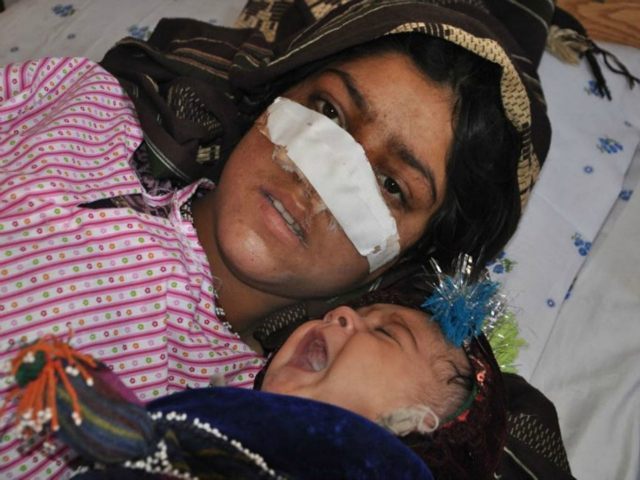An Afghan man fled to seek the support of the Taliban after he chopped off his wife’s nose in northern Faryab province.
Provincial district chief Syed Aqa Andarabi told the media the man mutilated his wife Reza Cul, 20, “due to family issues.” Her relatives “said her condition is critical as her nose has been completely chopped off.” She requires plastic surgery.
The man fled to an area under Taliban control.
The Afghanistan Independent Human Rights Commission posted the picture of Cul on Twitter and “condemned the incident.”
Translation: In Ghormach district, her husband chopped off her nose with a knife.
بینی خانم ریزهگل توسط شوهرش در ولسوالی غورماچ با چاقو بریده شدhttps://t.co/MShYCUHhQb pic.twitter.com/aYrnvmp5Yf
— AIHRC (@AfghanistanIHRC) January 18, 2016
The media and police did not specify the exact family issue that caused the horrific action. But in some areas, “slicing off a person’s nose is meant to shame them and show they have brought disgrace to their family or clan.”
Cases of nose chopping in Afghanistan are not new. In the early 2000s, Bibi Aisha’s father sold her to a Taliban fighter when she was only 12-years-old and married at 14. She fled abuse from her husband and in-laws when she was 18 in 2009, but the neighbors turned her in. Authorities jailed her, but her father took her away and gave her back to the in-laws. They promised to teat her well.
They took her to a “mountain clearing and held her down while his brother chopped off her nose and ears as other Talib watched. Then they left her to die in the mountains where they’d disfigured her.” She found her way to her grandfather, who sheltered her before giving her to the U.S. military for medical attention.
Time featured her on their front cover in August 2010 for an article titled, “Afghan Women and the Return of the Taliban.”
In 2014, a man chopped off his wife’s nose in central Afghanistan. He repeatedly abused her in the past as well.
“Her husband was a violent man,” explained Zakia Rizai, the head of Daykundi’s Women’s Affairs Department. “We saw evidence that he had removed her fingernails. Once, she was kept locked inside a room without food or water for a week.”
An Afghan woman’s heroin addict husband sliced off her nose and lips in early 2013 when she refused to sell her jewelry. Then he beat her with a stone before stealing her phone and ring.
Last month, a woman in Afghanistan told Radio Free Europe/Radio Liberty’s Radio Free Afghanistan that “in some areas of the country” the woman’s in-laws check her sheets for bloodstains after the wedding night. If the sheets lack blood, the in-laws can “demand that their ‘damaged’ daughter-in-law be exchanged for her sister.” The country imprisons non-virgins “for adultery.”
“In some cases, a bride’s ears and nose are cut off,” she explained. “They are forced into dirty clothes and taken back to her parent’s home. Their heads are shaved. The bride’s family is told that she is not a virgin. Other times, a bride is simply killed and her body is returned to her parents.”
An Afghan law passed in 2013 allows the government to stone to death anyone found guilty of adultery. Rohullah Qarizada, a member of the Sharia Islamic law committee, said there must be four witnesses in order for a couple to receive the stoning. Human rights groups could not believe the Afghanistan government would bring back the punishment after Taliban rule regularly executed couples in public for allegedly having premarital sex.
In March, protests broke out after a man wrongly accused Farkhunda, 27, for burning a Koran. She argued with a mullah [Muslim trained in religious law and doctrine] when she saw him selling charms outside of the Shah-e-Doshamshera shrine in Kabul. She claimed the charms “promoted superstition.” The mullah retaliated by claiming Farkhunda burned a Koran. People around the shrine overheard the man and attacked Farkhunda.
The mob “beat, stoned, and ran over” Farkhunda. After she died, she was thrown “into a river and set ablaze in the presence of policemen.”
Authorities did not find any evidence that Farkhunda burned a Koran. Mohammad Fariz Afzali, the head of Kabul’s criminal investigation, claimed the woman “was mentally ill,” and her family supported the suggestion. But one of Farkunda’s neighbors said the woman “was a graduate student in religious studies preparing to become a teacher.” The police fired their spokesman, Hashmatullah Stanekzai, after he “praised the murder on Facebook.”

COMMENTS
Please let us know if you're having issues with commenting.